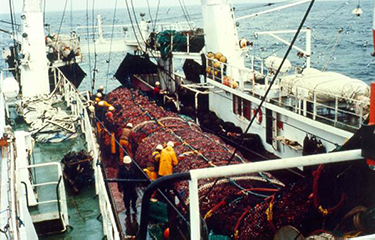Jack mackerel (Trachurus murphyi) – the main industrial fishery in the south-central zone of Chile – was dangerously overexploited at the beginning of the 2000s. Its subsequent management has been considered a success, and the species' recovery is now resulting in European seafood companies turning to it as an alternative to mackerel caught in the North Atlantic, a fishery that has become embroiled in management issues.
“There is a lot of interest in Chilean jack mackerel with the Marine Steward Council certification,” Veronica Ceballos, public affairs manager at Chile’s Association of Industrial Fisheries (ASIPES) – a nonprofit organization whose main objective is to promote sustainable industrial fishing development – told SeafoodSource. “The MSC’s international sustainability certification was achieved thanks to the work carried out by the member countries of the South Pacific Regional Fisheries Organization [SPRFMO], which since 2009 have carried out work to recover the jack mackerel. This has allowed Chile, according to figures from the SPRFMO’s Technical Scientific Committee, to go from 297,000 metric tons [MT] of jack mackerel catch in 2015 to 581,000 MT in 2022 – a 95.6 percent increase in just seven years.”
According to figures provided to SeafoodSource by ASIPES, in 2021 alone, Chile exported 227,342 MT of frozen jack mackerel with a total value of USD 245.9 million (EUR 240.7 million), and 15,062 MT of canned jack mackerel, earning USD 33.6 million (EUR 32.9 million). Chile’s Biobío Region produces the lion’s share of the country’s jack mackerel catchment, exporting 224,984 MT of frozen and 11,039 MT of canned jack mackerel in 2021.
Since 2014, SPRFMO has established a rebuilding plan for the management of jack mackerel in the South Pacific Ocean, assigning Chile a total allowable catch (TAC) at 64 percent of the biomass' maximum sustainable yield. Total quotas of 460,000 MT were set in 2015; for 2022, the TAC was set at 900,000 MT.
The resulting increase has Chilean firms looking to sell jack mackerel abroad. Commercial campaigns in Europe, mainly in Spain and Portugal, have been carried out by the company Orizon, Ceballos said. Orizon is a leading fishing company in Chile that belongs to Grupo de Empresas Copec, one of the largest business conglomerates in South America.
The increased catch and subsequent boost in commercial campaigns are starting to be felt in Europe. In June 2022, the North Atlantic Pelagic Advocacy Group (NAPA) published an open letter to fisheries ministers of European nations, warning that major retailers are beginning to favor Chile’s jack mackerel at the expense of North Atlantic mackerel.
“We are starting to see major retailers and manufacturers in Europe sourcing MSC-certified sustainable jack mackerel from Chile as an alternative to Northeast Atlantic mackerel. Unlike Northeast Atlantic mackerel, Chilean jack mackerel is sustainably managed and fished. The 15 nations catching Chilean jack mackerel in the South Pacific Ocean have been able to agree on a sustainable catch quota allocation in line with scientific advice,” the organization said.
NAPA partially blamed the success of Chilean jack mackerel on Northeast Atlantic coastal states’ failure to agree on fisheries management measures, leading to the withdrawal of MSC certification in 2019. The fishery has continued to be overfished, according to the International Council for the Exploration of the Seas, as coastal states haven’t reached agreements on how to divide up quota.
NAPA has called for the nations involved in the management of the fishery to act together in establishing a managed fishery with scientific-based quotas, and has written open letters to ministers in the region to take decisive action.
“We consider that the fishing industry deserves better. We reiterate that the countdown is on for coastal states to reach a quota sharing arrangement for iconic and globally-important pelagic fisheries in the Northeast Atlantic,” NAPA said. “The scientific advice is clear. The tools are all at hand. Coastal states only need to grasp them.”
According to NAPA, jack mackerel products can already be found on shelves at leading European retailers such as Migros, Delhaize, and Albert Heijn, and German seafood brand Followfood is planning to introduce canned Chilean jack mackerel in Germany. While current volumes imported to Europe are “relatively small,” there is significant growth potential, and Chile’s jack mackerel is very similar to Northeast Atlantic mackerel in taste, consistency, and omega-3 saturation, it said.
According to Ceballos, the fact that the fish is low-cost while also high in omega-3s and other nutrients has led the industry to commit more than 85 percent of the resource to human consumption – an effort she said is paying dividends.
Jack mackerel is also becoming increasingly used in domestic consumption in Chile. At the national level, according to a study by the fisheries promotion institute, Ifop, the annual per-capita consumption of seafood reached 15.78 kilograms in 2020, of which 3.55 kilograms came from jack mackerel, making it the most-consumed type of seafood in the country. Further, 65 percent of the canned jack mackerel produced in Coronel, in the Biobío Region, the national capital of this product, remains in Chile.
The SPRFMO Convention applies to the high seas of the South Pacific, covering about one-fourth of the Earth's high seas areas. Currently, the main commercial resources fished in the SPRFMO area are jack mackerel and jumbo flying squid.
The SPRFMO Commission currently has 15 members, including Australia, Chile, China, the Cook Islands, Cuba, Ecuador, the European Union, Denmark (the Faroe Islands), South Korea, New Zealand, Panama, Peru, Russia, Taipei, the U.S., and Vanuatu.
“Year after year, this resource shows a continuous recovery, which reaffirms the proper management that has been carried out,” Ceballos said.
Photo courtesy of the New Zealand National Institute of Water and Atmospheric Research







